The following contains spoilers for Hunters Season 2
Just before COVID-19 took hold of the Western World in March of 2020, the first season of Hunters dropped exclusively on Prime Video on February 21st. The series created by David Weil did not generate the pandemic cult WandaVision had, but it did leave a powerful impression on those who watched it. The second and final season is no different; Weil’s vision of a hypothetical and ever-cathartic finale to this brilliant adventure annihilating antisemitism worldwide was magnificent.
Hunters is a 1970s-period action/drama about a group of Jewish vigilantes who track down Nazis living under aliases in the United States, either illegally or legally, under Operation Paperclip. This ragtag group of misfits band together, each offering unique skills and their own vendetta. Over the course of the 10-episode first season, we watch Jonah (Logan Lerman) connect with the grandfather he never knew, Meyer (Al Pacino), after the death of his grandmother Ruth. Meyer manipulates Jonah’s grief and convinces him to join the Hunters, a group he claims Ruth co-created.
If you haven’t seen the first season, I suggest you stop reading this review because everything is a spoiler from here on out. If you’ve seen the first season, I recommend you rewatch it before diving into the new instalment. There is much to remember about the first season’s complicated schemes, betrayals and humanity.
In the finale of the first season of the Hunters, we discover that Meyer Offerman is, in fact, The Wolf, a Nazi doctor who diabolically took the identity of the real Meyer whom he experimented on in the camps. Jonah shoots him without a “fair trial” the Hunters prided themselves on giving the Nazi officers they executed. Therefore I was, at first, surprised to see Al Pacino’s name still in the cast listing for Season 2. However, his return makes all the more sense when you get into the meat of it.
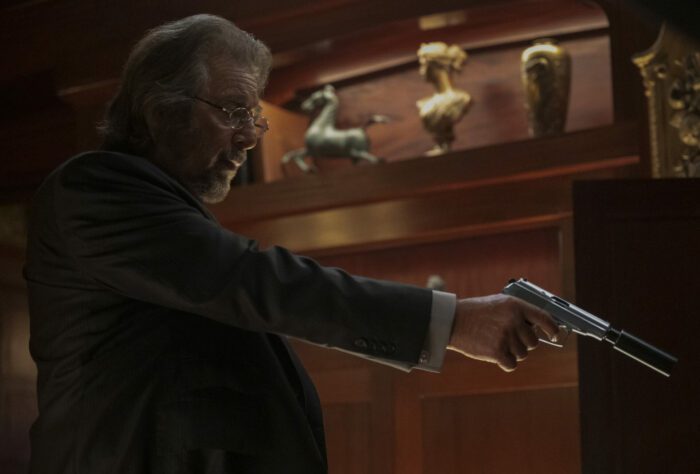
Credit: Courtesy of Prime Video
Copyright: Amazon Studios
Throughout the eight episodes, we follow Jonah and the Hunters on their search for Adolf Hitler; we also see flashbacks to the Wolf and how he rose to power in the Jewish community and organised the Hunters into the vigilante group they became. I struggled for some time with these flashbacks because they weren’t hitting me with the relevance to the current story David Weil was telling. Although, as we edge closer to the finale, it becomes much more apparent that the supposed guilt the Wolf may have felt for his crimes in the Holocaust, leading him to hunt down other Nazis, was not without selfish reason to save his skin.
Al Pacino’s performance nudges toward the core motif of Hunters’ new instalment: Evil does not die, it does not rest, and it does not retire, to which Sister Harriet (Kate Mulvany) then asks Jonah, “How can we?”
As much as we watch the execution of Nazi after Nazi, they cannot stop when they feel they’ve satisfied their revenge because there will always be those who vouch for white supremacy, who try to dismiss the pain they cause to marginalised groups as their God-given right to do so.
Hunters Season 2 explores Jonah in a different light: he is no longer naïve; he has experience, confidence, and initiative. Although, he is tainted by the crimes and cruelty of his past, and his co-conspirators no longer work with him. They have to be brought together by FBI Agent Millie (Jerika Hinton), who has to take justice into her own hands when a Nazi she brings in won’t go to trial for lack of firm evidence—which is bullsh*t.
Millie and Jonah bring the team back together in a chase for Adolf Hitler, whom they have great reason to believe is alive, hiding in South America. However, they are caught and brought in by another group of vigilantes working on the same theory led by Chava (Jennifer Jason Leigh), who also happens to be Jonah’s great-aunt. This coincidence is a little hard to believe, but for the sake of Jonah, we must put aside our doubts and be thankful he has a piece of family again, even if only for a brief while.
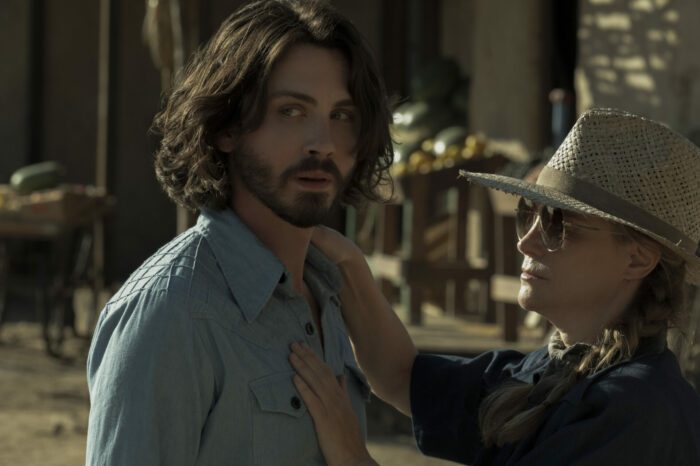
Credit: Courtesy of Prime Video
Copyright: Amazon Studios
The adventure of this series is truly a ride, but there is a certain amount of waiting you have to do for loose ends to pay off in the future. By far, my favourite episodes were 6-8 because Weil and his team of writers took the time to invest in the layers of cathartic emotions packed into the arrest and trial of Adolf Hitler. They take the time to debate it from different angles of the truth. Does Adolf Hitler deserve a fair trial? Does he deserve a lawyer? He is a human, after all. What would this world become without the impartial assessment of facts before sentencing? A world of questionable morals, a world Hitler would have likely ruled.
The showdown of Episode 6 (“Only the Dead”), is an action-packed and suspenseful sequence of events grounded by the beautiful send-off to Jonah taking Hitler through the tunnel with the figures and ghosts of Jewish people killed by Hitler’s Third Reich. It is emotional in the sacrifice Chava makes for Jonah, and in the justice we feel as Jonah stops Hitler from taking his own life because it shouldn’t have been Hitler’s choice how this story ends. I cannot say cathartic enough. I just kept wanting to cheer YES because it felt like winning for real.
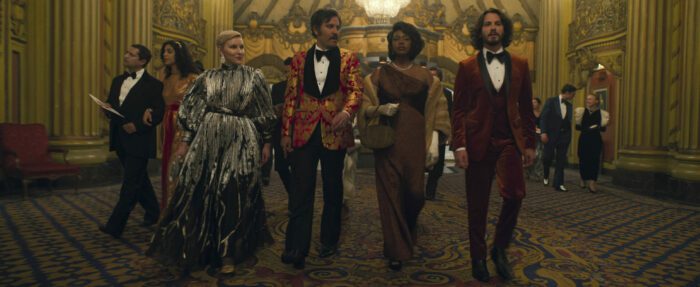
Credit: Courtesy of Prime Video
Copyright: Amazon Studios
At first, the second to last episode, “The Home,” felt out of place, odd, like filler, but the longer I watched I fell in love with the characters and the whimsy. It was like watching an entirely different show, yet it was worth it for the beautiful and tragic ghost story. It played out like a short film with a new set of characters to follow with new rules for reality. I could watch “The Home” by itself and feel satisfied by the playfulness mixed with the heart-wrenching story. Hunters does a fantastic job of fixating on the effect Hitler had on Jewish children. In the theoretical study of Hunters about a group of Jewish vigilante Nazi executioners, Hitler turned Jewish children into assassins the same way he turned Aryan Germans into coldhearted human exterminators. Hitler’s sermons created violence everywhere, regardless of the intended audience.
The finale, “The Trial of Adolf Hitler,” is an excellent party of cathartic wins. It comes with an exemplary performance by Carol Kane. Honestly, she is always magnificent and never disappoints in this series or any project, but her monologue on the stand was emotionally gratifying and incredibly performed. And the dialogue between Nyasha Hatendi and Josh Zuckerman in that courtroom shaped the episode’s meaning. Their performances, separate and echoing one another, make this trial all the more significant. Hatendi’s confidence combating Zuckerman’s inner conflict creates an epic and momentous conception of justice.
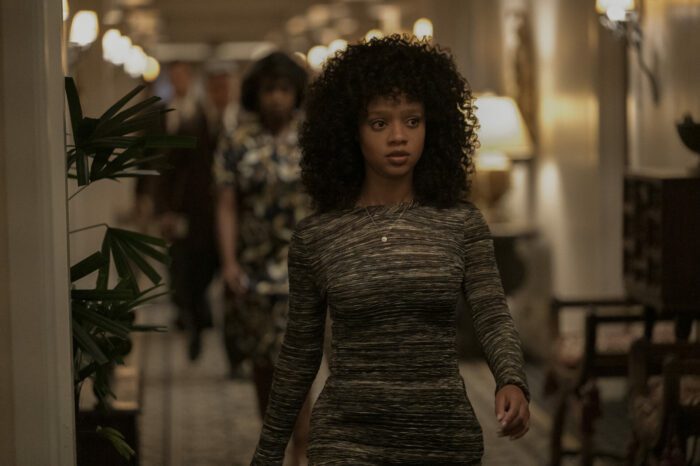
Credit: Courtesy of Prime Video
Copyright: Amazon Studios
Hunters isn’t without its missteps; I sometimes find Jennifer Jason Leigh’s performances half-baked, and some of the other character’s arcs felt hastily drawn to conclusions or messily stretched to fit the timeline. I loved Sister Harriet (Kate Mulvany) and Agent Millie Morris’s (Jerrika Hinton) kindling love story; it felt like a perfect fit. However, Roxy Jones (Tiffany Boone) and Lonny Flash (Josh Radnor) got some backstory and development but no firm conclusion or gratifying ending. In general, I think Roxy’s story is underserved in this narrative. I get she’s not a major character, but she has so much more potential than what’s given.
Udo Kier, who plays Adolf Hitler, does an admirable job of being the man we all assumed Hitler would be. However, next to Lena Olin, he is nothing. Perhaps that was the right choice; in the end, it makes Hitler look like a raving antisemitic lunatic and his wife Eva Braun (Lena Olin) look like the brain of the movement. It belittles the misogyny of it all and encapsulates white feminism as a meandering byproduct of white supremacy. Lena Olin is a marvel in this role; she is cold, calm, intriguing, and diabolical, but in the end, under Nazi rule, misogyny always wins—she’s murdered by her lover in the interest of his desire to be the leader of the Fourth Reich. An operation failure bound to disrupt the plans of power-hungry extremists who will always follow selfish desire over order as a fundamental flaw in their idea of freedom.
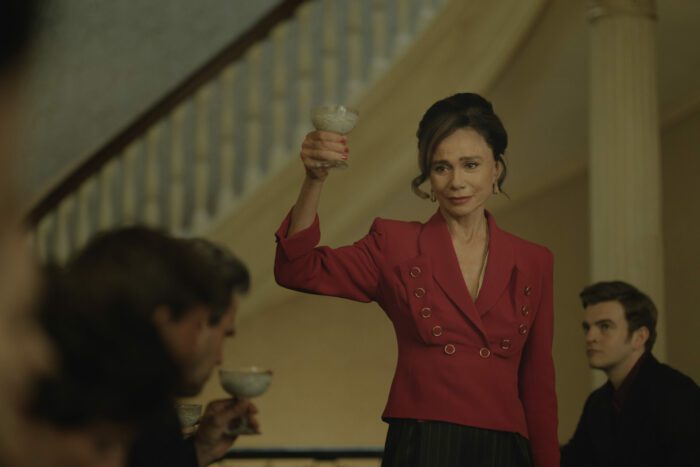
Credit: Christopher Saunders
Copyright: Amazon Studios
I can’t say enough how much this series tickled my tastebuds. There is so much packed into this story; it’s worth every minute to watch for how it pays off in the finale. I want to start watching all over again to pick out all the little details missed and the crumbs of insight trailing along, leading to a wonderful motif of Justice and Evil and Empathy Perseverance. I can’t say enough how good it feels to watch this story end. Truly an uptick to a horrible and maleficent history.

